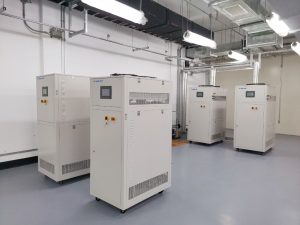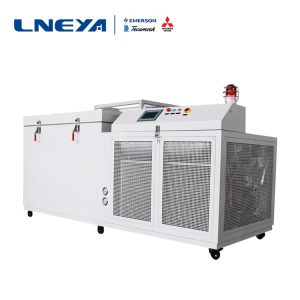Test of working temperature of electric vehicle power battery
The normal working temperature
range of power batteries for electric vehicles is -30 ~ 52 ° C, and the working
temperature range is -46 ~ 66 ° C, which is difficult to achieve with existing
power batteries. Although local warming measures can be used for battery packs,
they increase costs. Each type of battery has an optimum operating temperature
range, beyond which battery performance will be reduced or impaired. Therefore,
before the production of power batteries, manufacturers need to perform related
temperature tests or inspection agencies to perform similar tests.
The cooling and heating
system components of electric vehicles must be tested at different pressure
levels and temperatures. The performance and power consumption of these systems
must be tested to ensure that they do not significantly reduce the mileage of
the vehicle. In a typical test, a complete auxiliary heater or component, such
as a valve, hose, and other hollow valve, is inserted into a test slot on a
pressure cycle table.
A cooling circuit is
usually tested in a temperature range of minus 40 to 20 degrees, while a
heating circuit is tested in a temperature range of 20 to 140 degrees. Power
consumption and performance are usually tested at alternating temperatures.
Low-voltage or high-voltage power sources can be selected, and operation can be
simulated with on-board batteries and generators or traction accumulators. In
many electric vehicles today, heating and cooling systems can drain the
battery, negatively affecting the mileage of the car. By comparing the test
results before and after the load test on the pressure cycle test bench, we can
see how the change in battery power consumption and performance affects the
service life of the vehicle.
A comprehensive
long-term test usually takes 20 to 30 days, depending on how often the load
changes. The temperature and volume flow of the test medium and the ambient
temperature (if the test takes place in a climatic chamber) vary according to
the test specifications. The temperature and flow rate, pressure, and pressure
drop of the inlet and outlet of the test object circuit are continuously
measured. The test here focuses on the thermal and electrical performance of
the heating and cooling device under different environmental conditions.
Lneya’s new energy battery cooling
and heating system KRY series is widely used in production lines or testing
departments of related companies in China. The temperature control precision is
high, and the single fluid medium temperature control saves resources and
costs.
(The relevant information comes from the
Internet. If you have any questions, please contact the editorial department.)
Recomendaciones relacionadas
-
Operating Principle of LNEYA Industrial Air Cooled Chillers
1329Industrial Air Cooled Chillers is a heatexchanger which USES air to cool the hot fluid. The hot fluid in the tube isheated through the exchange of heat between the tube wall, the fin and theoutside air, which is usually supplied by the ventilat...
Ver detalles -
Instrucciones para fabricantes de congeladores de placas frías [-5 a -150 grados de refrigeración].
1080Hay varios fabricantes de Congelador de placa fría de baja temperatura. Es ampliamente utilizado en reactor de vidrio, reactor de metal y biorreactor para controlar la temperatura y temperature.Using gama de congelador de placa fría de baja temperaturaMediu...
Ver detalles -
Maintenance method of minus 17 ° C ultra-low temperature refrigerator
1026After the long-term use of the ultra-low temperature refrigerator of minus 17 °C, it is necessary to carry out certain maintenance work. If the user does not know how to carry out the maintenance work, you can contact the manufacturer to obtain th...
Ver detalles -
Introduction to mixed solution of glycol chilling systems (glycol chillers)
890Glycol chillers are industrial refrigeration systems that use a type of antifreeze called glycol, mixed with water, to lower the freezing point in the application of the chilling system. Glycol is a class of organic compounds that belong to the ...
Ver detalles
 LNEYA Enfriadoras industriales Fabricante Proveedor
LNEYA Enfriadoras industriales Fabricante Proveedor













